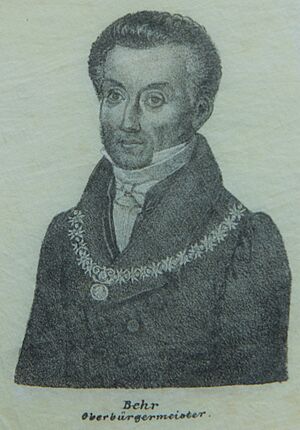William Joseph Behr facts for kids
William Joseph Behr (born August 26, 1775 – died August 1, 1851) was an important German writer and public speaker. He was known for speaking up about what he believed was right for his country. He worked as a professor and a mayor, and he tried to bring about changes in the government.
Early Life and Education
William Joseph Behr was born in a town called Sulzheim. He studied law at the University of Würzburg and the University of Göttingen. After finishing his studies, he became a professor at the University of Würzburg in 1799. He taught about the laws of the country.
A Voice for Change
In 1819, Behr was chosen to represent his university in the Landtag of Bavaria. The Landtag was like a state parliament or assembly. He joined a group that wanted to make changes and improve the government. Because of this, the king, Maximilian I, and his court became suspicious of Behr. However, the king's son, who later became King Louis I, supported him for a while.
In 1821, Behr was elected as the mayor of Würzburg. This meant he had to leave his job as a professor and his seat in the Landtag. But he did not stop trying to bring about reforms. He kept pushing for changes in the government.
Facing Challenges
Behr was elected to the Landtag again in 1825 and 1831, this time representing the city of Würzburg. However, the king would not let him leave his mayor's job to attend the Landtag meetings.
In 1832, Behr gave a speech that the government thought was dangerous. They believed he was speaking against the king. He was arrested and kept in prison. Even though he said he was loyal to the idea of having a king, he stayed in jail. In 1836, he was found guilty of trying to harm the king's reputation. He admitted his actions, but he was not set free until 1839. For the next nine years, the police watched him closely in the towns of Passau and Regensburg.
Freedom and Recognition
In 1848, Behr finally received a full pardon. He also received some money as payment for what he had gone through. In May of that year, he was elected to the German national assembly, which met in Frankfurt. This was a big honor, showing that people still respected him. He spent his last years in Bamberg.
 | Georgia Louise Harris Brown |
 | Julian Abele |
 | Norma Merrick Sklarek |
 | William Sidney Pittman |


